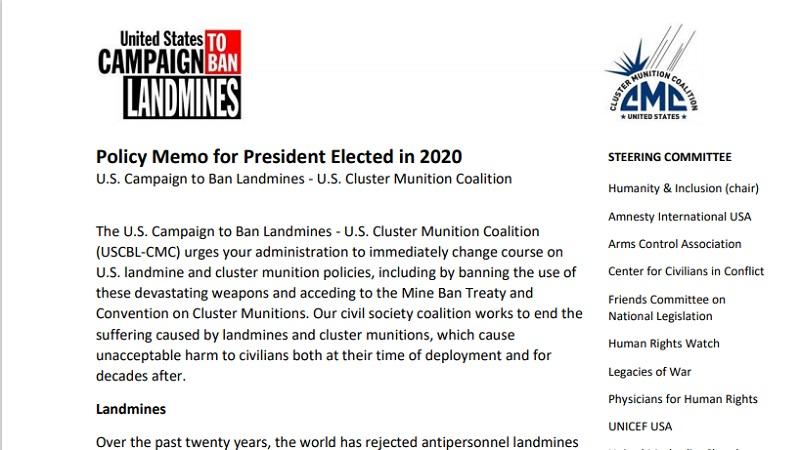Today, the U.S. Campaign to Ban Landmines-U.S. Cluster Munition Coalition released a memo demanding a reversal of changes made in the past three years that have moved the United States further from support of international agreements banning antipersonnel mines and cluster munitions. That memo is copied in full below and available as a pdf here. See also press release.
Policy Memo for President Elected in 2020
U.S. Campaign to Ban Landmines - U.S. Cluster Munition Coalition
The U.S. Campaign to Ban Landmines - U.S. Cluster Munition Coalition (USCBL-CMC) urges your administration to immediately change course on U.S. landmine and cluster munition policies, including by banning the use of these devastating weapons and acceding to the Mine Ban Treaty and Convention on Cluster Munitions. Our civil society coalition works to end the suffering caused by landmines and cluster munitions, which cause unacceptable harm to civilians both at their time of deployment and for decades after.
Landmines
Over the past twenty years, the world has rejected antipersonnel landmines through the Mine Ban Treaty – to which 164 countries, including every other member of NATO, are states parties -- in recognition of the horrific effects of landmines on civilian communities around the world. While not a signatory, the U.S. had functionally adhered to key provisions of the Mine Ban Treaty – except those prohibiting the U.S. from ordering the use of landmines on the Korean peninsula.
However, the new landmine policy announced in January 2020, starkly sets the U.S. apart from its allies and the global consensus by allowing for the use of landmines anywhere in the world. While the new policy claims that non-persistent mines minimize civilian harm, the Mine Ban Treaty rejects the use of such mines and the faulty premise underpinning them. Decades of efforts to enhance the “safety” of landmines have failed. No matter the technology, landmines are indiscriminate weapons. Regardless of their lifespan, they are victim activated and do not distinguish between a combatant or a civilian while active, rendering them incapable of abiding by international humanitarian law.
In recognition of the dangers landmines pose to civilians and U.S. service members alike, the United States has not used antipersonnel landmines since 1991, excluding the use of a single munition in 2002; it has not exported them since 1992; and has not produced them since 1997. In the last five years, only the government forces of Syria, Myanmar, and North Korea, as well as non-state actors in conflict areas, have used antipersonnel landmines. Of the more than 50 countries that once produced landmines, 41 have ceased production. Under the current landmine policy, the U.S. could rejoin a small handful of mine-producing countries -- company the United States should not keep.
Cluster Munitions
As with landmines, there is a global consensus against the use of cluster munitions. The Convention on Cluster Munitions, which bans the use, production, transfer, and stockpiling of cluster munitions, has 110 states parties, including the vast majority of U.S. NATO allies.
The United States has not used cluster munitions in more than a decade. The last significant U.S. use of cluster munitions was during Operation Iraqi Freedom in 2003 -- where a high failure rate resulted in the deaths of civilians and multiple U.S. service members. There does not appear to have been any U.S. use of cluster munitions since then with the exception of a single attack in Yemen in December 2009. U.S. production of cluster munitions has also ceased; the last U.S.-based producer announced an end to production in 2016 as the global community has moved away from purchasing these indiscriminate weapons.
In 2008, the United States committed to never use cluster munitions that result in more than a 1% failure rate by the end of 2018. From 2013-2018, the U.S. joined other states in multiple UN General Assembly resolutions condemning the use of cluster munitions in Syria, recognizing the devastating humanitarian impact of these weapons.
However, in 2017 the Trump administration abandoned that commitment, stating that it needed to retain the ability to use such weapons. That policy change took the United States further away from our NATO allies and the global consensus.
Humanitarian Mine Action
Despite significant backsliding on U.S. military landmines and cluster munition policy, the U.S. can and should be proud of its world-leading funding and technical support to mine clearance, stockpile destruction, mine risk education, and victim assistance efforts across the globe -- amounting to more than $220 million in 2019 alone. We urge your administration to continue to grow these efforts.
Urgent Recommendations for your First 100 Days
We urge your administration to promptly take the following measures, within the first 100 days of your term:
- Ban the use, production, and transfer of antipersonnel landmines and cluster munitions. The White House should immediately issue a policy commitment against using antipersonnel landmines and cluster munitions. The White House should also state that it will not sell or transfer any type of antipersonnel landmine or cluster munition to any other government or partner.
- Accede to the Mine Ban Treaty and the Convention on Cluster Munitions. Within the first 100 days of inauguration, the White House should declare its intent to accede to the Mine Ban Treaty and the Convention on Cluster Munitions. In order to identify and overcome any remaining obstacles to accession to these treaties, the administration should undertake a comprehensive review of U.S. landmine and cluster munition policies. Finally, the administration should participate in regular meetings of both the Convention on Cluster Munitions and the Mine Ban Treaty.
- Lay out an accelerated timeline for the destruction of stockpiled landmines and cluster munitions, providing concrete plans and mechanisms for public reporting on progress.


